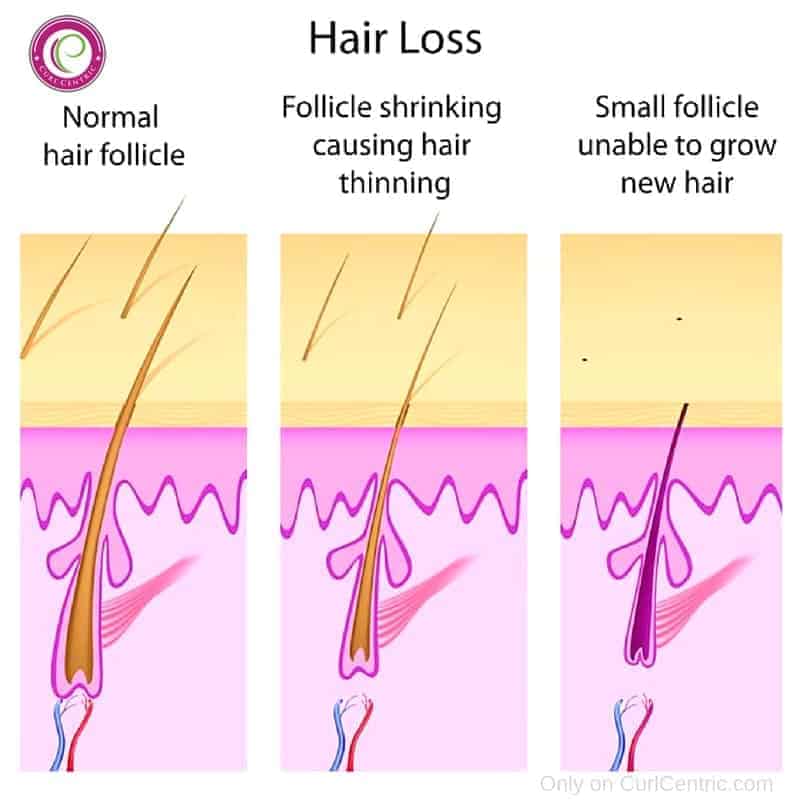
Balding and other forms of hair loss (like shedding or thinning) are often mistakenly thought to only impact males.
The truth is females make up a significant amount of individuals that suffer from hair loss-related diseases.
By age 40, nearly 40% of women have noticeable hair loss (or hair fall). That statistic comes from the American Academy of Dermatology.
As you know, female hair loss can have a negative emotional impact on self-esteem. Much more so than when a male goes through hair loss.
It is generally more acceptable in today’s society for men to be bald relative to female pattern baldness.
While it's true that hair loss isn’t life-threatening, there should be reasonable solutions for females who don’t want to suffer through any unnecessary emotional trauma caused by losing their hair.
Even if it’s only the feeling of being unattractive, the psychological damage can be mentally devastating and impact the body like a serious disease due to intense stress and emotional toll, which can negatively impact a female’s physical health.
Curl Centric understands how seriously life-altering this situation can be and has put together the following overview on hair loss in hopes of providing some direction for those who are experiencing these circumstances.
In this guide, we'll cover what causes your curly hair to fall out and potential treatment options, including natural home remedies.
Table of Contents
- 1 Overview of Curly Hair Loss: What Causes Curly Hair to Fall Out?
- 2 When Is There Cause for Concern?
- 3 Pin
- 4 Common Causes of Hair Shedding and Hair Thinning
- 5 How to Stop Your Hair From Falling Out
- 6 Treatment Options: Including Natural Home Remedies
- 6.1 1. Mediterranean Diet
- 6.2 2. Protein
- 6.3 3. Vitamin A
- 6.4 4. Multivitamin
- 6.5 5. Vitamin D
- 6.6 6. Biotin
- 6.7 7. Saw Palmetto
- 6.8 8. Ginseng
- 6.9 9. Washing Your Hair Regularly
- 6.10 10. Coconut oil
- 6.11 11. Incorporate Protective Styling
- 6.12 12. Avoid (or Limit) Hair Processing
- 6.13 13. Red Light Laser Therapy
- 6.14 14. Platelet-rich Plasma (PRP)
- 6.15 15. Minoxidil
- 6.16 16. Finasteride
- 6.17 17. Essential Oils
- 6.18 18. Implement Scalp Massages
- 6.19 19. Use Yoga as a Stress Reliever
- 7 Can Garlic Help Reverse Alopecia Areata?
- 8 What About Onion Juice?
- 9 Are Growth Supplements or Vitamins Useful or Not?
- 10 Green Tea (Polyphenols) Hair Regrowth
- 11 Using Caffeine Hair Regrowth
- 12 Does the Hair Ever Grow Back?
Overview of Curly Hair Loss: What Causes Curly Hair to Fall Out?
Certain medications, illnesses, and infections are all potential causes of hair loss in women. Frankly, anything that can interfere with the hair growth cycle could potentially cause female hair loss.
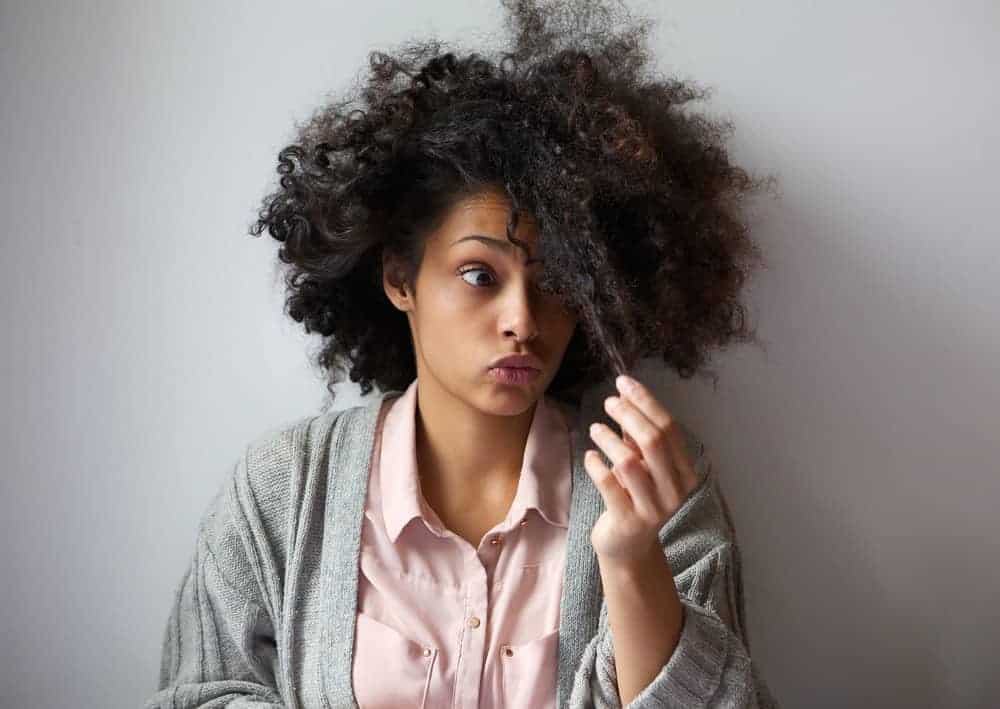
While hereditary male pattern baldness is considered common, female hair loss is also widespread. In fact, women and men have very similar probabilities of having some form of thinning hair.
The American Academy of Dermatology considers losing 50 to 100 hair strands each day perfectly normal.
So, obviously, seeing some measure of shedding each day isn’t necessarily cause for concern. However, if the hair loss seems excessive or occurs suddenly, you may want to dig a little deeper.
When Is There Cause for Concern?
Hair thinning often occurs slowly, and you may not immediately recognize that you have a potential problem.
Obviously, if your hair begins to fall out in clumps, there is definitely a need to seek medical advice. If your hair loss is specific to one area of your scalp, you likely have focal hair loss.
However, if your hair loss isn’t isolated to a specific scalp region, then you may have what’s considered to be general hair loss.
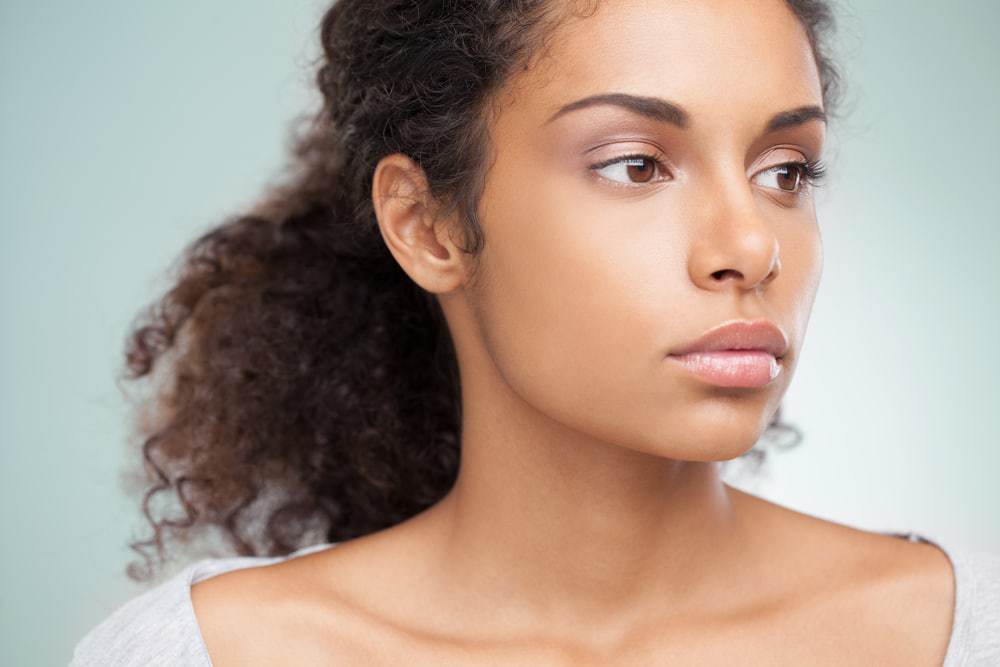
If you wake up in the morning and find an unusual amount of hair on your pillow or if there is more hair than normal leftover in the comb, there could be cause for concern.
It’s important that you begin to recognize visual cues that may indicate a potential problem.
When diagnosing the culprit of hair loss, medical professionals will often perform some preliminary blood work to determine if the thyroid gland or an autoimmune disease is the problem.
Doctors also inquire about family history to determine if a recognizable pattern can be identified. If hair loss runs in your family, then the potential is greater for you to experience hair loss.
Common Causes of Hair Shedding and Hair Thinning
- Hair loss is often inherited - meaning it’s something that is a part of your family tree. This common hair loss is generally referred to as female-pattern hair loss. You may have also heard of male-pattern hair loss or hereditary male-pattern baldness.
- As you age, the growth rate of your hair slows down. The hair also generally becomes thinner, breaks more easily, and usually turns gray as you get older.
- Wearing tight hairstyles that pull the hair too aggressively can cause hair shedding or thinning curly hair. We often recommend protective styles to mitigate stressing your edges and protect your ends, encouraging length retention.
- Unbalanced diets, thyroid diseases, chemotherapy, ringworm of the scalp, and physical stress often caused by surgery or illness are also common hair loss causes.
Note that this list of common hair loss causes isn’t all-inclusive. There could very well be something unidentified in the above list that causes hair loss for you.
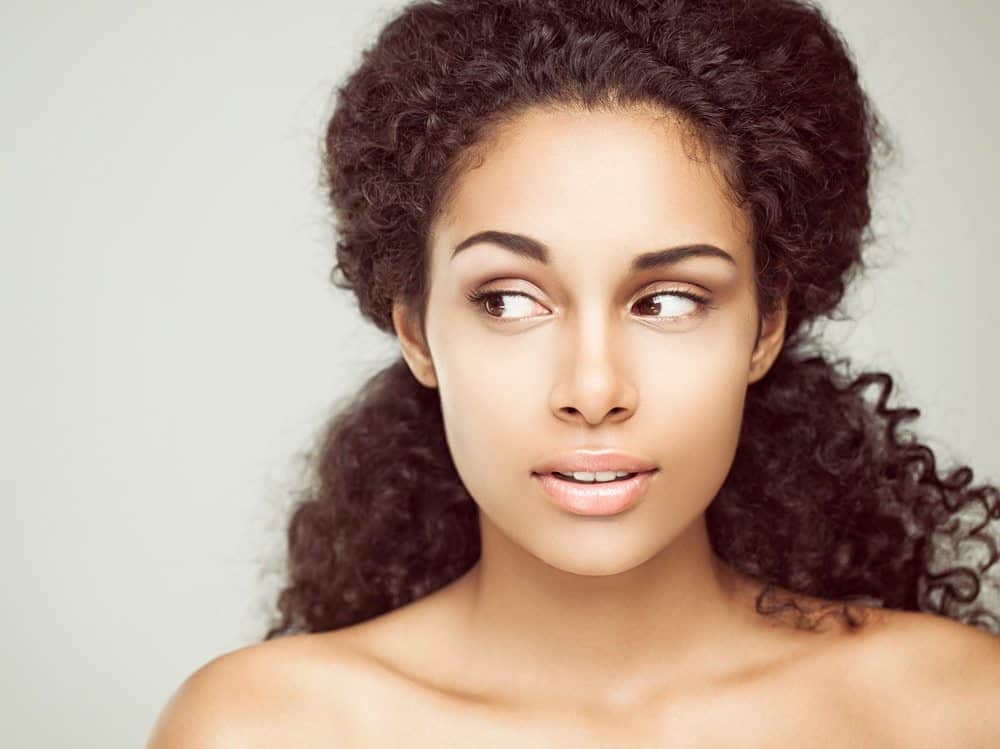
How to Stop Your Hair From Falling Out
Hair loss is typically diagnosed through a series of questions, scalp examinations, hair loss patterns, and other hair-related tests (including testing hair samples).
It’s also not uncommon for medical professionals to conduct blood examinations as they investigate potential problems.
Treatment Options: Including Natural Home Remedies
Ultimately, treatment scenarios presented by a medical professional should be specific to your particular situation.
For some, hair thinning or female-pattern hair loss isn’t a concern. For others, treatment will be highly desired.
Some medications may mitigate hair loss, and hair transplant surgery is generally an option - if the situation warrants it. Some women choose to wear wigs (e.g., headband wig or lace front wig) or change the way they style their hair.
For example, if the hair loss is isolated to a particular area of your scalp, you may decide to style your hair in such a way that it covers the thinning area. Many people refer to this method as a “comb-over” technique.
If the hair loss is caused by something that medical professionals believe can be treated or eliminated, you may have additional options like a current medication you're taking. It’s best to discuss the potential options with your doctor.
During the discussion with your doctor, be sure to ask the following questions:
- Do you recommend a particular treatment?
- What is the duration of the treatment?
- Is the solution permanent?
- Are there side effects or risks associated with the treatment?
- Costs?
- Will the recommended treatment be covered by my medical insurance?

1. Mediterranean Diet
In 2018, a study revealed that eating a diet containing fresh herbs and raw vegetables, such as the Mediterranean diet, reduces the risk of androgenic alopecia ( male or female pattern baldness) or slows down its onset.
Learn more about the Mediterranean diet with this book from Amazon: The Complete Mediterranean Cookbook. The book contains more than 500 healthy recipes using a variety of fresh ingredients.
2. Protein
Your hair follicles are made primarily of keratin, which is a type of protein. A 2017 study done on 100 people suffering from hair loss noticed some nutritional deficiencies in the participants, including amino acids, which are the building blocks of protein.
According to researchers, eating a diet rich in protein can help prevent hair loss. Some of the protein-rich foods include eggs, beans, nuts, fish, peas, and chicken.
3. Vitamin A
Vitamin A is partly made up of retinoids, which studies show can improve the rate of hair growth. Vitamin A also helps in the production of sebum, which helps keep your scalp healthy.
Foods rich in vitamin A include spinach, sweet potatoes, sweet peppers, and many others. Our article outlining the best foods for hair growth will help you with any meal planning needs.
4. Multivitamin
According to scientists, Vitamins A, B, C, and D, iron, zinc, and selenium are all needed for healthy hair growth and retention processes.
Multivitamins are available in drug stores and most grocery stores. Your doctor can also prescribe a multivitamin based on your individual needs.
5. Vitamin D
A 2017 study revealed that vitamin D supplements could help treat non-scarring alopecia to boost hair regrowth.
6. Biotin
Biotin, which is also referred to as vitamin H or B7, is needed for fatty acid synthesis in your body. This process is vital to the hair growth cycle, and if you don't have enough biotin, you will undoubtedly experience hair loss.
Is vitamin deficiency a concern? It's highly unlikely because biotin deficiencies are very rare. If you think you might have a biotin deficiency, work with your doctor to determine how much biotin you should take.
7. Saw Palmetto
This herb is derived from the American dwarf pine tree fruits, and it can be used to maintain testosterone levels in the body.
A 2004 study on saw palmetto showed that 60% of participants taking 200 milligrams of the herb daily experienced improved hair growth.
8. Ginseng
Although further study is needed, ginseng has been shown to contain phytochemicals that promote hair growth.
You may take ginseng supplements or use topical solutions that are infused with ginseng. Since more research is needed, we recommend consulting with your doctor before using ginseng.
9. Washing Your Hair Regularly
Making it a habit to wash your hair regularly keeps the scalp clean and healthy, reducing hair loss. We also recommend using a gentle shampoo instead of a stronger one which may lead to additional hair breakage and dryness.
If you're wondering how often to wash your hair, read this article to set up a hair-washing schedule.
10. Coconut oil
Many studies have shown that coconut oil can help prevent hair damage from UV light exposure and daily styling routines.
Coconut oil contains lauric acid, which binds protein in the hair, strengthening it and protecting it from breakage.
11. Incorporate Protective Styling
Some hairstyles, such as tight ponytails or braids, can pull your hair at the roots (particularly around the edges), potentially leading to excessive shedding.
Wear hairstyles that don't pull on your hair too tight (i.e., protective hairstyles), and add more gentle styling techniques to your natural hair regimen.
Straightening irons, hair dryers, and other heat styling tools may also lead to additional hair damage, so you might want to avoid them as much as possible.
12. Avoid (or Limit) Hair Processing
Common chemical treatments, such as hair coloring, relaxers, and perms, can also lead to hair loss.
Before using chemical treatments, ask your stylist if there are better alternatives, such as natural hair dyes (like using henna leaves for coloring) or other products that don't contain nearly as many harmful chemicals.
13. Red Light Laser Therapy
Low-level lasers have been used to help chemotherapy patients and people suffering from genetic hair loss improve hair density (source).
The process is referred to as red light therapy, and it works by stimulating your epidermal stem cells. If you're interested in DIY red light therapy devices, they're available here on Amazon.
14. Platelet-rich Plasma (PRP)
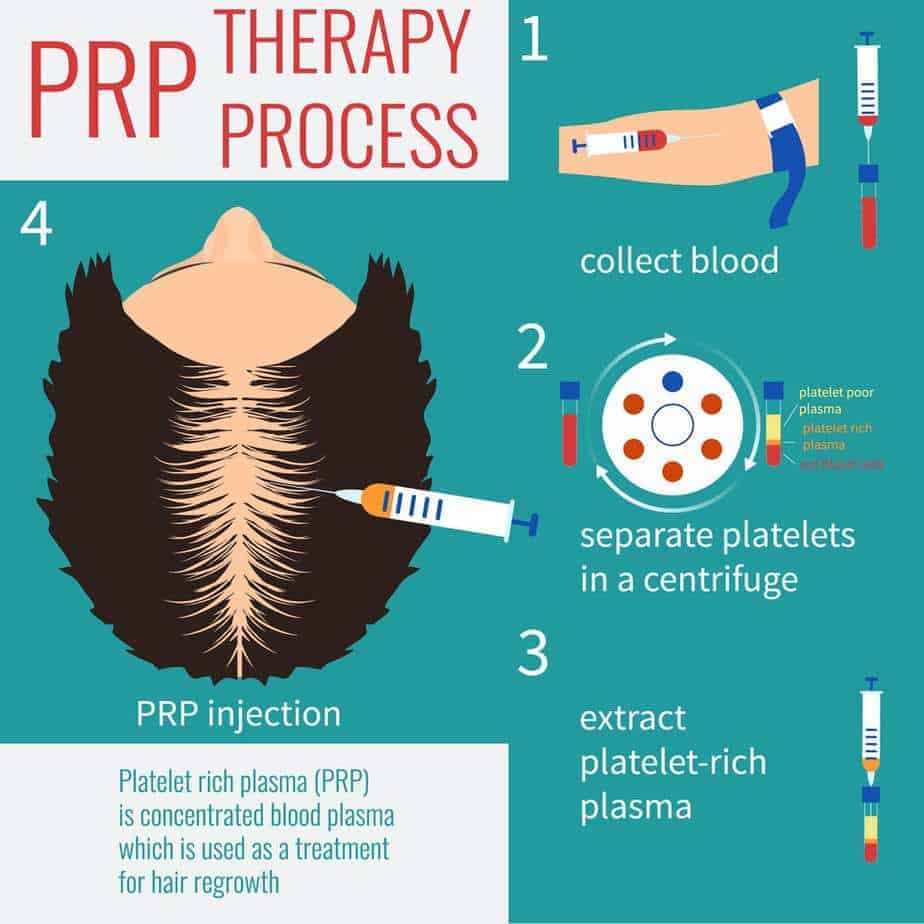
Platelet-rich plasmas (PRP) may be injected into the scalp to stimulate hair growth in the areas affected by hair loss. According to a 2017 study, results found a 30% increase in hair growth for 11 participants who had been injected with PRP for four sessions.
These sessions are often not covered by health insurance providers but can be purchased locally in many major cities in the United States. Sessions are often expensive, selling for as much as $1000 in some cities.
15. Minoxidil
Also known as Rogaine, minoxidil is an over-the-counter drug that works for around 66% of the women who have tried it, according to the Mayo Clinic.
You should apply the minoxidil liquid or foam to the scalp daily. Side effects may include acne, scalp irritation, irregular heartbeat, or blurred vision.
16. Finasteride
Also known as Propecia, finasteride is a prescription pill that helps slow down hair loss and promotes hair regrowth. We recommend discussing this option with your doctor to determine if it's the right solution for your specific needs.
17. Essential Oils
According to studies, essential oils can help reduce hair loss. In 1998, a study divided 86 people suffering from hair loss into two groups, one group used cedarwood oil mixed with rosemary and lavender oil on their scalps, and the other group didn't use any oils.
After a few months, 43% of the group using the essential oil treatment had positive results and significant improvement in their condition.
Other essential oils that can be used include lemongrass, peppermint, and lavender oil. It would be best to mix a few drops of the essential oils with a carrier oil such as jojoba oil before applying them to your scalp.
18. Implement Scalp Massages
A scalp massage feels fantastic, and it's relaxing. On top of that, scalp massages encourage hair growth. A small 2016 study revealed that a four-minute massage every day for 24 weeks helped participants boost their hair growth.
19. Use Yoga as a Stress Reliever
Stress can lead to hair loss, and as we all know, yoga is an excellent way to reduce stress. There are many highly effective yoga poses.
We recommend trying the forward bend, downward-facing dog, camel pose, fish pose, shoulder stand, and kneeling pose.
Can Garlic Help Reverse Alopecia Areata?
In a scientific study, it's been shown that garlic stimulates hair growth for people who have alopecia areata. Alopecia areata is a type of hair loss.
In the study, garlic gel was applied to the scalp of the subjects and led to an overall increase in hair growth relative to the baseline.
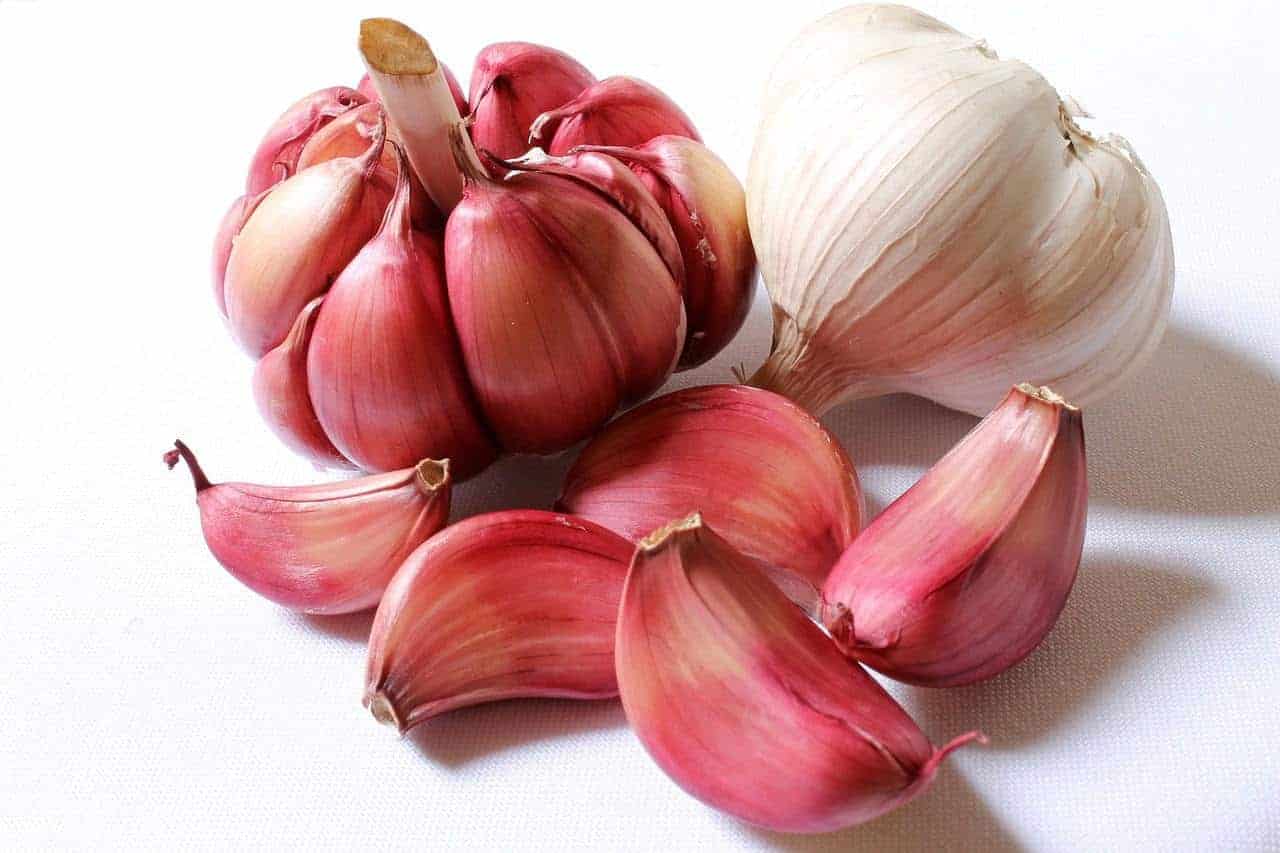
Another study states that patients using a mixture of garlic gel along with a steroid cream responded better in comparison to those who only used the steroid cream. Steroid creams are a commonly used treatment for alopecia areata.
What About Onion Juice?
Onion juice (that’s right, crushed-up onions) was found to enhance hair growth compared to tap water.
This means, without the use of steroids, it’s possible that crushed onions can stimulate hair growth for alopecia areata treatment.
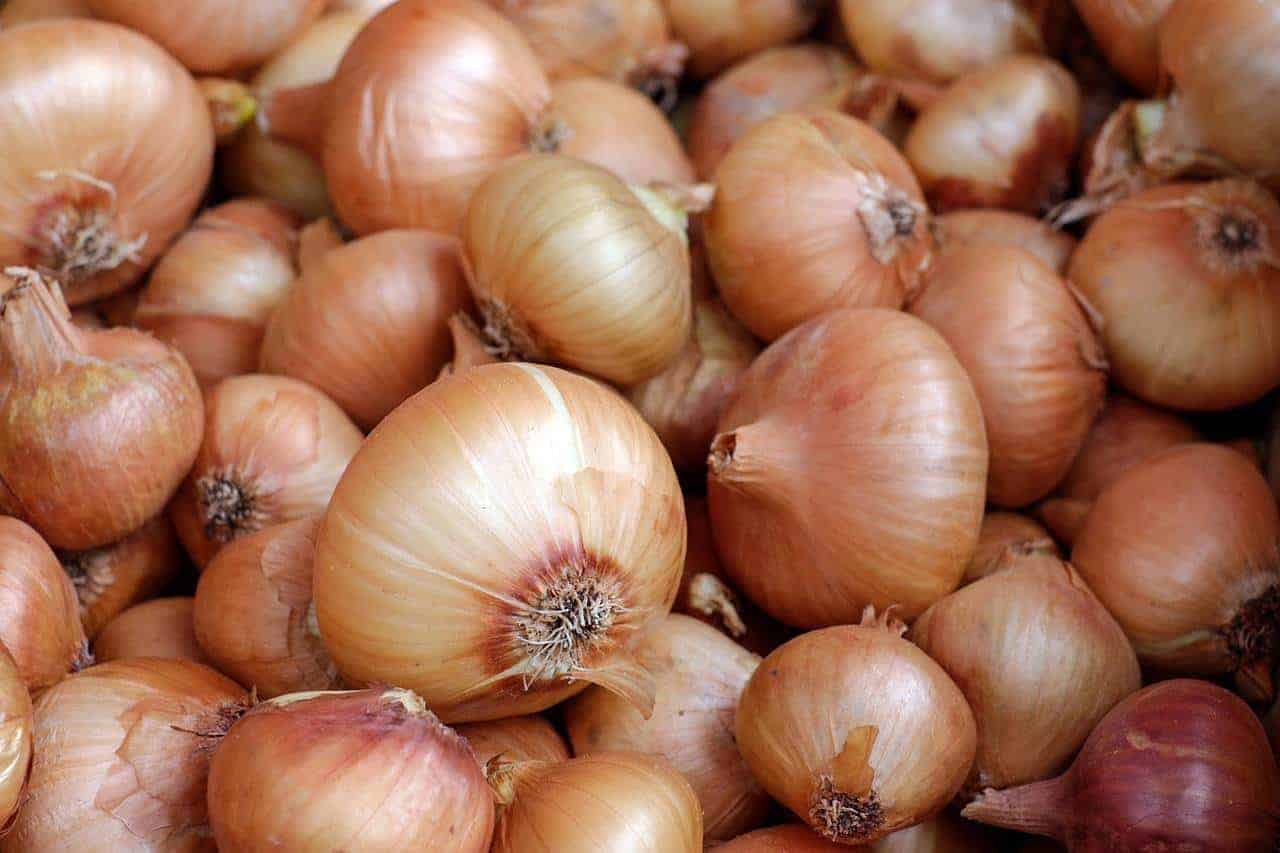
With alopecia areata, the immune system attacks the hair follicles. Certain chemicals in garlic and onion juices can reduce the speed of this process or completely stop the immune system from attacking the hair follicles altogether.
Are Growth Supplements or Vitamins Useful or Not?

There is evidence of supplements being useful for mitigating the amount of hair shedding experienced.
For example, iron and Lysine, an amino acid that the body can't produce naturally, can help reduce hair shedding. Although, Lysine cannot increase hair growth.
Green Tea (Polyphenols) Hair Regrowth
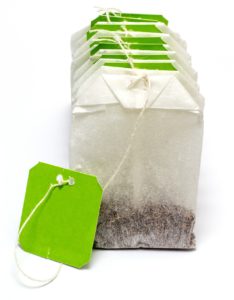
Currently, green tea is being studied as a potential treatment option for alopecia areata.
The benefits of using green tea are thought to be superior to its counterpart, black tea, as the roasting process involved in the preparation of black tea oxidizes the polyphenols.
Existing studies have been conducted on rats and human hair in a petri-dish, but not yet on real people.
Nonetheless, the results of the existing studies have shown encouraging results.
The polyphenols have stimulated the re-growth of hair in existing studies. Therefore, if you are experiencing hair thinning or shedding, utilizing a tea rinse for your hair might be worth the experiment.
Using Caffeine Hair Regrowth
Many people do not know this, but your hair follicles can absorb certain drugs. Caffeine is a drug that can be absorbed by the hair follicles.
Actually, tests done on human hair in a petri-dish have revealed that the hair follicles rapidly absorb caffeine, which in turn stimulates hair growth in sections that previously had shown signs of excessive hair shedding or loss.
Does the Hair Ever Grow Back?
It really depends on the cause of your hair loss. For example, if the hair loss is related to chemotherapy, it’s not uncommon for the hair to grow back once the treatment ceases.
However, if the hair loss is hereditary, your hair likely won’t grow back naturally. There are hair loss treatments that you can consider; be sure to discuss your options with a medical professional.
- Does Wearing a Durag Cause Hair Loss?
- Does Kratom Cause Hair Loss?
- Does Head and Shoulders Cause Hair Loss?
- Does Amlodipine Cause Hair Loss?
- Does Vegamour Work for Hair Loss?
Is Curly Hair More Prone to Hair Loss?
Curly hair isn't inherently more prone to hair loss. However, curly hair is often more prone to breakage. This makes it seem like there is more hair loss than there actually is and the texture of curls naturally traps hairs that fall. Additionally, when certain hair care practices and styling techniques are used on curly hair, like tight hairstyles or excessive heat styling, it can contribute to breakage and hair loss.
Is It Normal for Curly Hair to Fall Out a Lot?
With curly and straight hair, it's normal for some hair to fall out each day as part of the hair's natural growth cycle. However, if you notice a lot of hair coming out when you brush or wash your hair or if you're experiencing bald patches or thinning areas, it may be a sign of a larger problem.
Why Is My Curly Hair Falling Out So Much?
There are many possible reasons why your curly hair may be falling out more than usual. Many people believe that hormone shifts are the most common cause, although there are many common causes that include genetics, stress, hormonal changes, medication side effects, and certain medical conditions. It's important to identify the underlying cause in order to determine the best course of treatment. Consult with a dermatologist or hair loss specialist to determine the cause.
Do Curly Hair Products Cause Hair Loss?
Curly hair products, Curlsmith and Kinky-Curly, themselves don't typically cause hair loss. However, some products may contain ingredients that can irritate the scalp or clog hair follicles, which can contribute to hair loss. It's important to choose products that are specifically formulated for curly hair types and to avoid any products that cause scalp irritation or discomfort.
Does Curly Girl Method Cause Hair Loss?
The Curly Girl Method is a hair care regimen promoting healthy, natural curls without harsh chemicals or heat styling tools, at no point should the Curly Girl Method cause extreme hair loss. When done correctly, it shouldn't cause hair loss. However, if your regimen involves excessive manipulation or pulling of the hair, or if it's not what your hair type needs, it could potentially contribute to breakage and hair loss.

